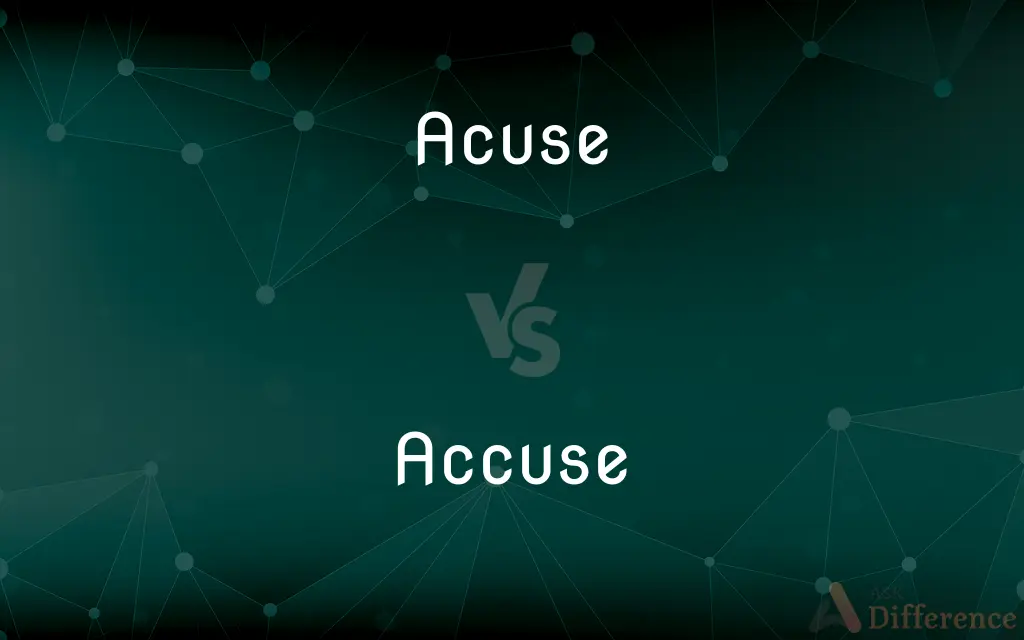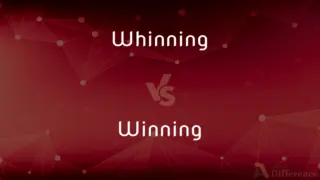Acuse vs. Accuse — Which is Correct Spelling?
By Tayyaba Rehman — Updated on April 3, 2024
"Acuse" is an incorrect spelling. The correct spelling is "Accuse", meaning to claim that someone has done something wrong.

Table of Contents
Which is correct: Acuse or Accuse
How to spell Accuse?

Acuse
Incorrect Spelling

Accuse
Correct Spelling
ADVERTISEMENT
Key Differences
Think of "Accuse" having double 'c' for double certainty before blaming someone.
"Acc-" is a common prefix in words like "Accept" and "Accommodate". Remember, "Accuse" belongs to this family.
The word has two parts: “Ac” and “cuse”. The “cuse” reminds us of “excuse”, which has a similar theme of blame or exoneration.
Visualize a courtroom scene where a person is "accused" with emphasis, representing the double 'c' in the word.
Associate the word with a phrase: "Double the 'c', double the claim."
ADVERTISEMENT
How Do You Spell Accuse Correctly?
Incorrect: The lawyer will acuse the witness of lying.
Correct: The lawyer will accuse the witness of lying.
Incorrect: They were quick to acuse her of cheating.
Correct: They were quick to accuse her of cheating.
Incorrect: She wanted to acuse him of stealing.
Correct: She wanted to accuse him of stealing.
Incorrect: Can you acuse someone without evidence?
Correct: Can you accuse someone without evidence?
Incorrect: He didn't acuse anyone without proof.
Correct: He didn't accuse anyone without proof.
Accuse Definitions
Accuse means to point out a person as guilty of a specific act.
He was accused of spreading rumors.
To accuse is to state that someone is responsible for a misdeed.
Parents often have to figure out which child to accuse when things break.
To accuse is to allege a wrongdoing against someone, often formally.
The citizen accused the officer of misconduct.
Accuse refers to the act of blaming someone for a fault or crime.
The manager accused the employee of being late.
To charge with a shortcoming or error.
To charge formally with a wrongdoing.
To make a charge of wrongdoing against another.
(transitive) to find fault with, blame, censure
To charge with having committed a crime or offence
For the U.S. President to be impeached, he must be accused of a high crime or misdemeanor.
(intransitive) to make an accusation against someone
(obsolete) Accusation.
Accusation.
To charge with, or declare to have committed, a crime or offense
Neither can they prove the things whereof they now accuse me.
We are accused of having persuaded Austria and Sardinia to lay down their arms.
To charge with a fault; to blame; to censure.
Their thoughts the meanwhile accusing or else excusing one another.
To betray; to show.
Bring an accusation against; level a charge against;
He charged the man with spousal abuse
Blame for, make a claim of wrongdoing or misbehavior against;
He charged me director with indifference
To accuse is to claim that someone has committed an offense or wrongdoing.
She accused him of theft.
Accuse Meaning in a Sentence
She was afraid to accuse her coworker of taking her ideas.
The teacher had to accuse a student of breaking the rules.
To accuse someone formally, you need substantial evidence.
The detective decided to accuse the suspect after finding new evidence.
Teachers advise students not to accuse peers without speaking to an adult first.
It is a serious matter to accuse a public figure of misconduct.
To accuse someone of lying can damage relationships if you're wrong.
Common Curiosities
Which vowel is used before Accuse?
The vowel "e" is typically used before Accuse, as in "to accuse."
Why is it called Accuse?
Accuse originates from the Latin word "accūsāre," meaning to call to account or to charge with a fault.
Which conjunction is used with Accuse?
No specific conjunction is inherently linked to the word "accuse." It can be used in conjunction with any conjunction appropriate to the context of the sentence.
Which preposition is used with Accuse?
"Of" is the most common preposition used with Accuse, as in "accused of."
What is the plural form of Accuse?
Again, verbs don't have plural forms, but the noun "accusation" has the plural form "accusations."
What is the verb form of Accuse?
The verb form is "accuse."
What is the pronunciation of Accuse?
Accuse is pronounced as /əˈkjuːz/.
Is Accuse an abstract noun?
No, Accuse is a verb. However, "accusation" (a related noun) can be considered abstract.
What is the root word of Accuse?
The root word is the Latin "accūsāre."
Which article is used with Accuse?
Accuse is a verb and doesn't require an article. However, when talking about the act or a specific instance, "the" might be used, as in "the accusation."
Is the Accuse term a metaphor?
No, Accuse is not a metaphor. It can be used in metaphorical contexts, but in itself, it is not a metaphor.
Is Accuse an adverb?
No, Accuse is not an adverb.
Is Accuse a vowel or consonant?
Accuse is a word, not a single letter. It contains both vowels and consonants.
How many syllables are in Accuse?
Accuse has two syllables.
What part of speech is Accuse?
Accuse is a verb.
What is the singular form of Accuse?
Accuse is a verb, so it doesn't have a singular or plural form like nouns do. However, the singular form for the noun "accusation" is "accusation."
Is Accuse a noun or adjective?
Accuse is a verb.
Is Accuse a countable noun?
Accuse is a verb, not a noun.
Is Accuse a collective noun?
No, Accuse is a verb.
What is the first form of Accuse?
The first form (base form) is "accuse."
Is the word Accuse is Gerund?
The gerund form of Accuse is "accusing."
What is another term for Accuse?
Another term for Accuse is "charge" or "allege."
Which determiner is used with Accuse?
As a verb, Accuse does not require a determiner. If referring to an act or instance of accusing, determiners like "the" or "an" can be used with related nouns.
How is Accuse used in a sentence?
"She accused him of stealing her purse."
Is the word Accuse is imperative?
It can be used in the imperative form, e.g., "Accuse him!"
Is the word “Accuse” a Direct object or an Indirect object?
"Accuse" is a verb. However, in sentences, the person or thing being accused can be the direct object.
How do we divide Accuse into syllables?
Accuse can be divided as ac-cuse.
What is a stressed syllable in Accuse?
The second syllable, "cuse," is stressed.
What is the second form of Accuse?
The second form (past simple) is "accused."
What is the third form of Accuse?
The third form (past participle) is "accused."
Is Accuse a negative or positive word?
Accuse is generally perceived as negative since it implies blaming someone.
What is the opposite of Accuse?
The opposite of Accuse can be "exonerate" or "absolve."
Share Your Discovery

Previous Comparison
Foging vs. Fogging
Next Comparison
Whinning vs. WinningAuthor Spotlight
Written by
Tayyaba RehmanTayyaba Rehman is a distinguished writer, currently serving as a primary contributor to askdifference.com. As a researcher in semantics and etymology, Tayyaba's passion for the complexity of languages and their distinctions has found a perfect home on the platform. Tayyaba delves into the intricacies of language, distinguishing between commonly confused words and phrases, thereby providing clarity for readers worldwide.


































